
Unit 4 The Professor and the Yo-Yo I.Teaching Aims 1.Enlarge the students'vocabulary by learning the new words and doing the vocabulary exercises 2.Help the studentsto get the general idea of the article 3.Help the students learn from Einstein. 4.Help the students to build up their language skills through more exercises on oral practice,phrases and expression,grammar,writing.etc. II.Key and Difficult Points 1.New Words and Phrases at ease,off balance,come to terms with,immune,correspond,mean nothing to,so much so that,revert to,take apart,bewilder,single out 2.Sentences (1)As a shy young visitor to Einstein's home.I was made to feel at ease when Einstein said,… (2)When my turn came,I displayed my few tricks and pointed out to him that the incorrectly looped string had thrown the toy off balance. (3)As a boy and then as an adult.I never lost my wonder at the personality that was Einstein. (4)He seemed immune to these emotions.He was beyond any pretension. (5)He had developed theories that were profound and capable of exciting relatively few scientists III.Teaching Methods Discussion,explanation,ask and answer IV.Time:4 periods V.Teaching Procedures:
Unit 4 The Professor and the Yo-Yo I. Teaching Aims 1. Enlarge the students’ vocabulary by learning the new words and doing the vocabulary exercises. 2. Help the students to get the general idea of the article. 3. Help the students learn from Einstein. 4. Help the students to build up their language skills through more exercises on oral practice, phrases and expression, grammar, writing, etc. II. Key and Difficult Points 1. New Words and Phrases at ease, off balance, come to terms with, immune, correspond, mean nothing to, so much so that, revert to, take apart, bewilder, single out 2. Sentences (1) As a shy young visitor to Einstein’s home, I was made to feel at ease when Einstein said, … (2) When my turn came, I displayed my few tricks and pointed out to him that the incorrectly looped string had thrown the toy off balance. (3) As a boy and then as an adult, I never lost my wonder at the personality that was Einstein. (4) He seemed immune to these emotions. He was beyond any pretension. (5) He had developed theories that were profound and capable of exciting relatively few scientists. III. Teaching Methods Discussion, explanation, ask and answer IV. Time: 4 periods V. Teaching Procedures:
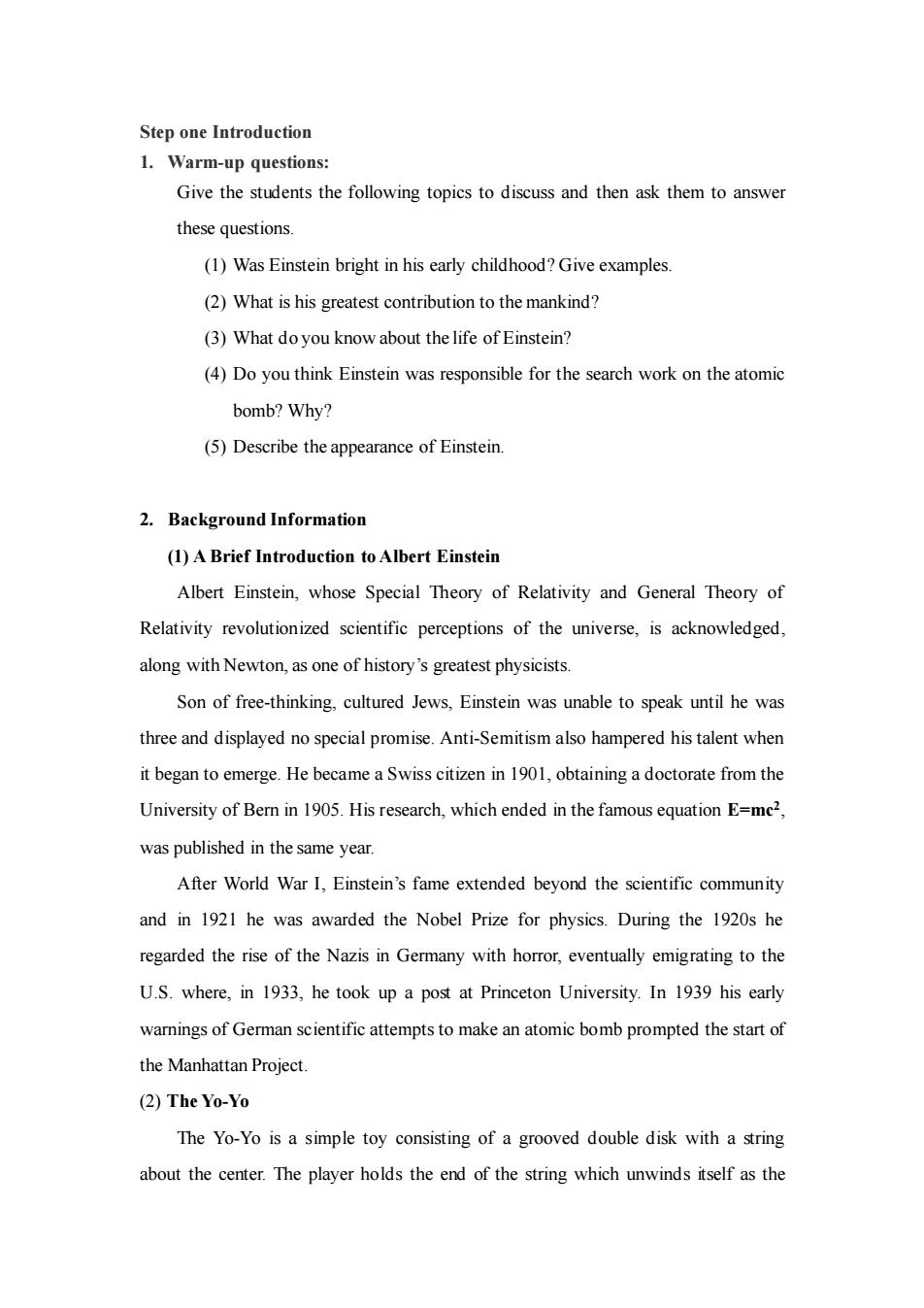
Step one Introduction 1.Warm-up questions: Give the students the following topics to discuss and then ask them to answer these questions (1)Was Einstein bright in his early childhood?Give examples. (2)What is his greatest contribution to the mankind? (3)What doyou know about the life of Einstein? (4)Do you think Einstein was responsible for the search work on the atomic bomb?Why? (5)Describe the appearance of Einstein. 2.Background Information (1)A Brief Introduction to Albert Einstein Albert Einstein,whose Special Theory of Relativity and General Theory of Relativity revolutionized scientific perceptions of the universe,is acknowledged along with Newton,as one of history's greatest physicists. Son of free-thinking,cultured Jews,Einstein was unable to speak until he was three and displayed no special promise.Anti-Semitism also hampered his talent when it began to emerge.He became a Swiss citizen in 1901,obtaining a doctorate from the University of Bern in 1905.His research,which ended in the famous equation E=me2, was published in the same year. After World War I,Einstein's fame extended beyond the scientific community and in 1921 he was awarded the Nobel Prize for physics.During the 1920s he regarded the rise of the Nazis in Germany with horror,eventually emigrating to the U.S.where,in 1933,he took up a post at Princeton University.In 1939 his early warnings of German scientific attempts to make an atomic bomb prompted the start of the Manhattan Project. (2)The Yo-Yo The Yo-Yo is a simple toy consisting of a grooved double disk with a string about the center.The player holds the end of the string which unwinds itself as the
Step one Introduction 1. Warm-up questions: Give the students the following topics to discuss and then ask them to answer these questions. (1) Was Einstein bright in his early childhood? Give examples. (2) What is his greatest contribution to the mankind? (3) What do you know about the life of Einstein? (4) Do you think Einstein was responsible for the search work on the atomic bomb? Why? (5) Describe the appearance of Einstein. 2. Background Information (1) A Brief Introduction to Albert Einstein Albert Einstein, whose Special Theory of Relativity and General Theory of Relativity revolutionized scientific perceptions of the universe, is acknowledged, along with Newton, as one of history’s greatest physicists. Son of free-thinking, cultured Jews, Einstein was unable to speak until he was three and displayed no special promise. Anti-Semitism also hampered his talent when it began to emerge. He became a Swiss citizen in 1901, obtaining a doctorate from the University of Bern in 1905. His research, which ended in the famous equation E=mc2 , was published in the same year. After World War I, Einstein’s fame extended beyond the scientific community and in 1921 he was awarded the Nobel Prize for physics. During the 1920s he regarded the rise of the Nazis in Germany with horror, eventually emigrating to the U.S. where, in 1933, he took up a post at Princeton University. In 1939 his early warnings of German scientific attempts to make an atomic bomb prompted the start of the Manhattan Project. (2) The Yo-Yo The Yo-Yo is a simple toy consisting of a grooved double disk with a string about the center. The player holds the end of the string which unwinds itself as the
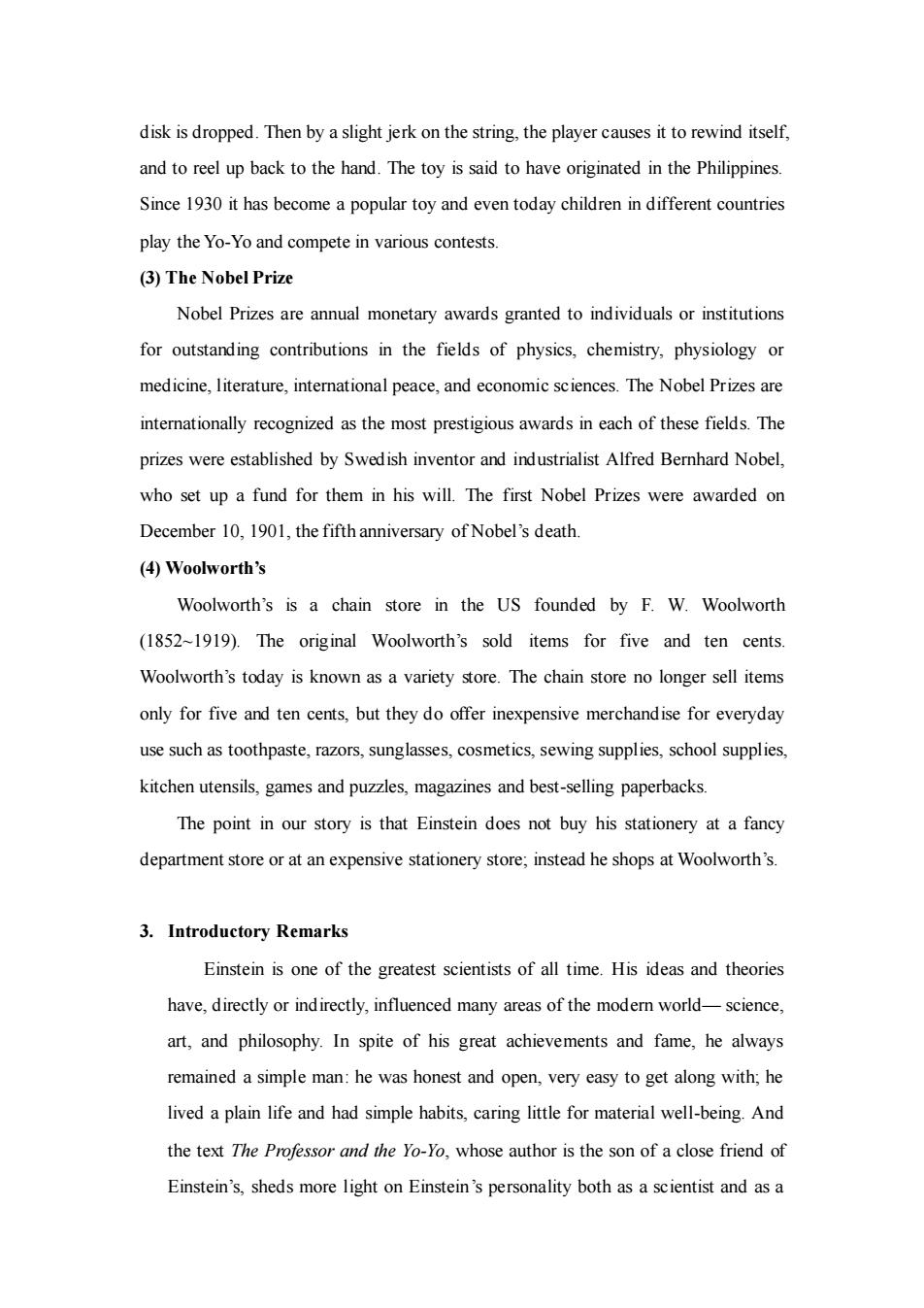
disk is dropped.Then by a slight jerk on the string.the player causes it to rewind itself, and to reel up back to the hand.The toy is said to have originated in the Philippines. Since 1930 it has become a popular toy and even today children in different countries play the Yo-Yo and compete in various contests. (③)The Nobel Prize Nobel Prizes are annual monetary awards granted to individuals or institutions for outstanding contributions in the fields of physics,chemistry,physiology or medicine,literature,international peace,and economic sciences.The Nobel Prizes are internationally recognized as the most prestigious awards in each of these fields.The prizes were established by Swedish inventor and industrialist Alfred Bemhard Nobel who set up a fund for them in his will.The first Nobel Prizes were awarded on December 10,1901,the fifth anniversary of Nobel's death. (4)Woolworth's Woolworth's is a chain store in the US founded by F.W.Woolworth (1852-1919).The original Woolworth's sold items for five and ten cents. Woolworth's today is known as a variety store.The chain store no longer sell items only for five and ten cents,but they do offer inexpensive merchandise for everyday use such as toothpaste,razors,sunglasses,cosmetics,sewing supplies,school supplies. kitchen utensils,games and puzzles,magazines and best-selling paperbacks. The point in our story is that Einstein does not buy his stationery at a fancy department store or at an expensive stationery store,instead he shops at Woolworth's 3.Introductory Remarks Einstein is one of the greatest scientists of all time.His ideas and theories have,directly or indirectly,influenced many areas of the modem world-science. art,and philosophy.In spite of his great achievements and fame,he always remained a simple man:he was honest and open,very easy to get along with;he lived a plain life and had simple habits,caring little for material well-being.And the text The Professor and the Yo-Yo,whose author is the son of a close friend of Einstein's,sheds more light on Einstein's personality both as a scientist and as a
disk is dropped. Then by a slight jerk on the string, the player causes it to rewind itself, and to reel up back to the hand. The toy is said to have originated in the Philippines. Since 1930 it has become a popular toy and even today children in different countries play the Yo-Yo and compete in various contests. (3) The Nobel Prize Nobel Prizes are annual monetary awards granted to individuals or institutions for outstanding contributions in the fields of physics, chemistry, physiology or medicine, literature, international peace, and economic sciences. The Nobel Prizes are internationally recognized as the most prestigious awards in each of these fields. The prizes were established by Swedish inventor and industrialist Alfred Bernhard Nobel, who set up a fund for them in his will. The first Nobel Prizes were awarded on December 10, 1901, the fifth anniversary of Nobel’s death. (4) Woolworth’s Woolworth’s is a chain store in the US founded by F. W. Woolworth (1852~1919). The original Woolworth’s sold items for five and ten cents. Woolworth’s today is known as a variety store. The chain store no longer sell items only for five and ten cents, but they do offer inexpensive merchandise for everyday use such as toothpaste, razors, sunglasses, cosmetics, sewing supplies, school supplies, kitchen utensils, games and puzzles, magazines and best-selling paperbacks. The point in our story is that Einstein does not buy his stationery at a fancy department store or at an expensive stationery store; instead he shops at Woolworth’s. 3. Introductory Remarks Einstein is one of the greatest scientists of all time. His ideas and theories have, directly or indirectly, influenced many areas of the modern world— science, art, and philosophy. In spite of his great achievements and fame, he always remained a simple man: he was honest and open, very easy to get along with; he lived a plain life and had simple habits, caring little for material well-being. And the text The Professor and the Yo-Yo, whose author is the son of a close friend of Einstein’s, sheds more light on Einstein’s personality both as a scientist and as a
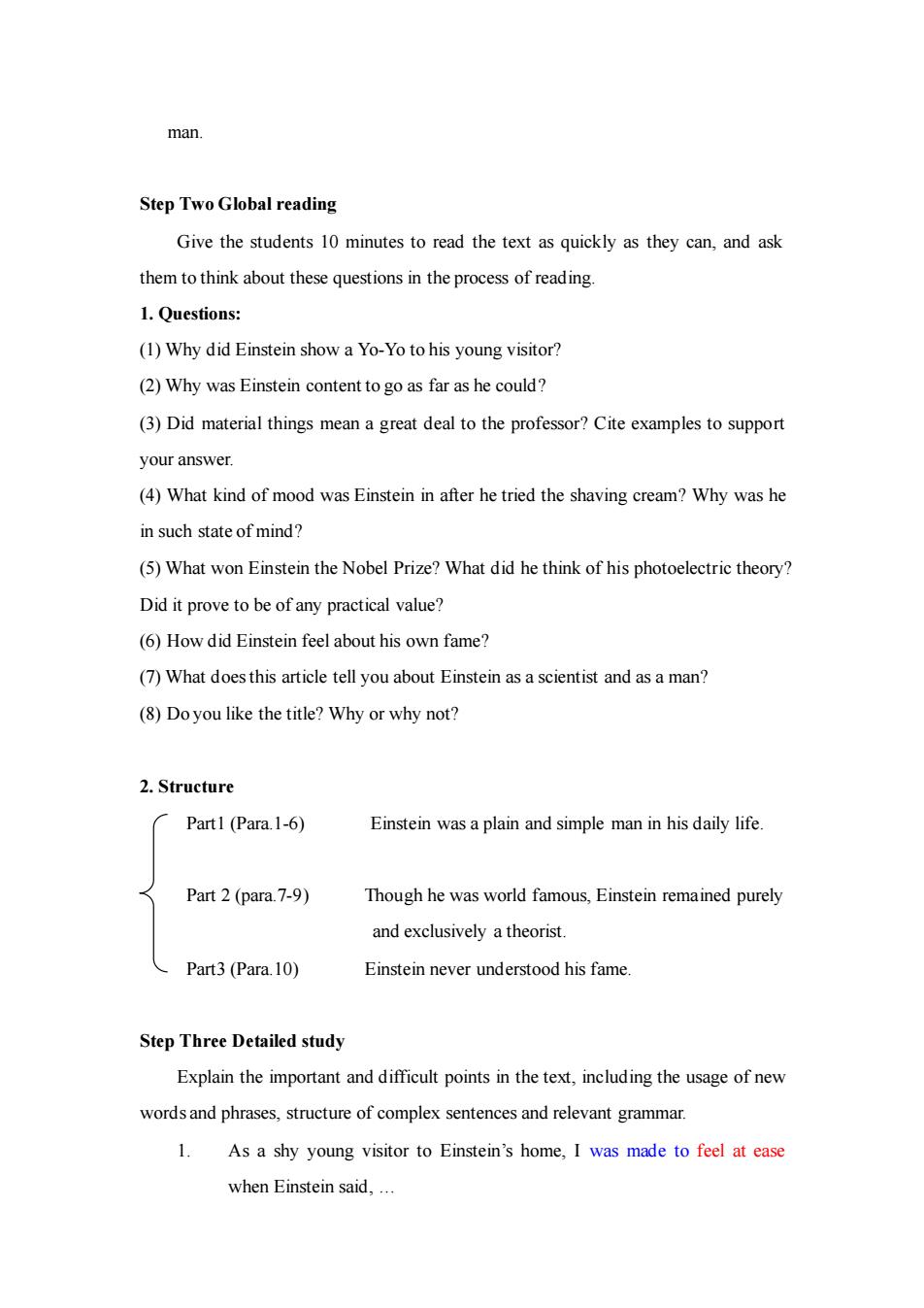
man. Step Two Global reading Give the students 10 minutes to read the text as quickly as they can,and ask them to think about these questions in the process of reading. 1.Questions: (1)Why did Einstein show a Yo-Yo to his young visitor? (2)Why was Einstein content to go as far as he could? ()Did material things mean a great deal to the professor?Cite examples to support your answer (4)What kind of mood was Einstein in after he tried the shaving cream?Why was he in such state of mind? (5)What won Einstein the Nobel Prize?What did he think of his photoelectric theory? Did it prove to be of any practical value? (6)How did Einstein feel about his own fame? (7)What does this article tell you about Einstein as a scientist and as a man? (8)Doyou like the title?Why or why not? 2.Structure Part1(Para.1-6) Einstein was a plain and simple man in his daily life Part 2(para.7-9) Though he was world famous,Einstein remained purely and exclusively a theorist. Part3(Para.10) Einstein never understood his fame Step Three Detailed study Explain the important and difficult points in the text,including the usage of new words and phrases,structure of complex sentences and relevant grammar 1. As a shy young visitor to Einstein's home,I was made to feel at ease when Einstein said
man. Step Two Global reading Give the students 10 minutes to read the text as quickly as they can, and ask them to think about these questions in the process of reading. 1. Questions: (1) Why did Einstein show a Yo-Yo to his young visitor? (2) Why was Einstein content to go as far as he could? (3) Did material things mean a great deal to the professor? Cite examples to support your answer. (4) What kind of mood was Einstein in after he tried the shaving cream? Why was he in such state of mind? (5) What won Einstein the Nobel Prize? What did he think of his photoelectric theory? Did it prove to be of any practical value? (6) How did Einstein feel about his own fame? (7) What does this article tell you about Einstein as a scientist and as a man? (8) Do you like the title? Why or why not? 2. Structure Part1 (Para.1-6) Einstein was a plain and simple man in his daily life. Part 2 (para.7-9) Though he was world famous, Einstein remained purely and exclusively a theorist. Part3 (Para.10) Einstein never understood his fame. Step Three Detailed study Explain the important and difficult points in the text, including the usage of new words and phrases, structure of complex sentences and relevant grammar. 1. As a shy young visitor to Einstein’s home, I was made to feel at ease when Einstein said, …
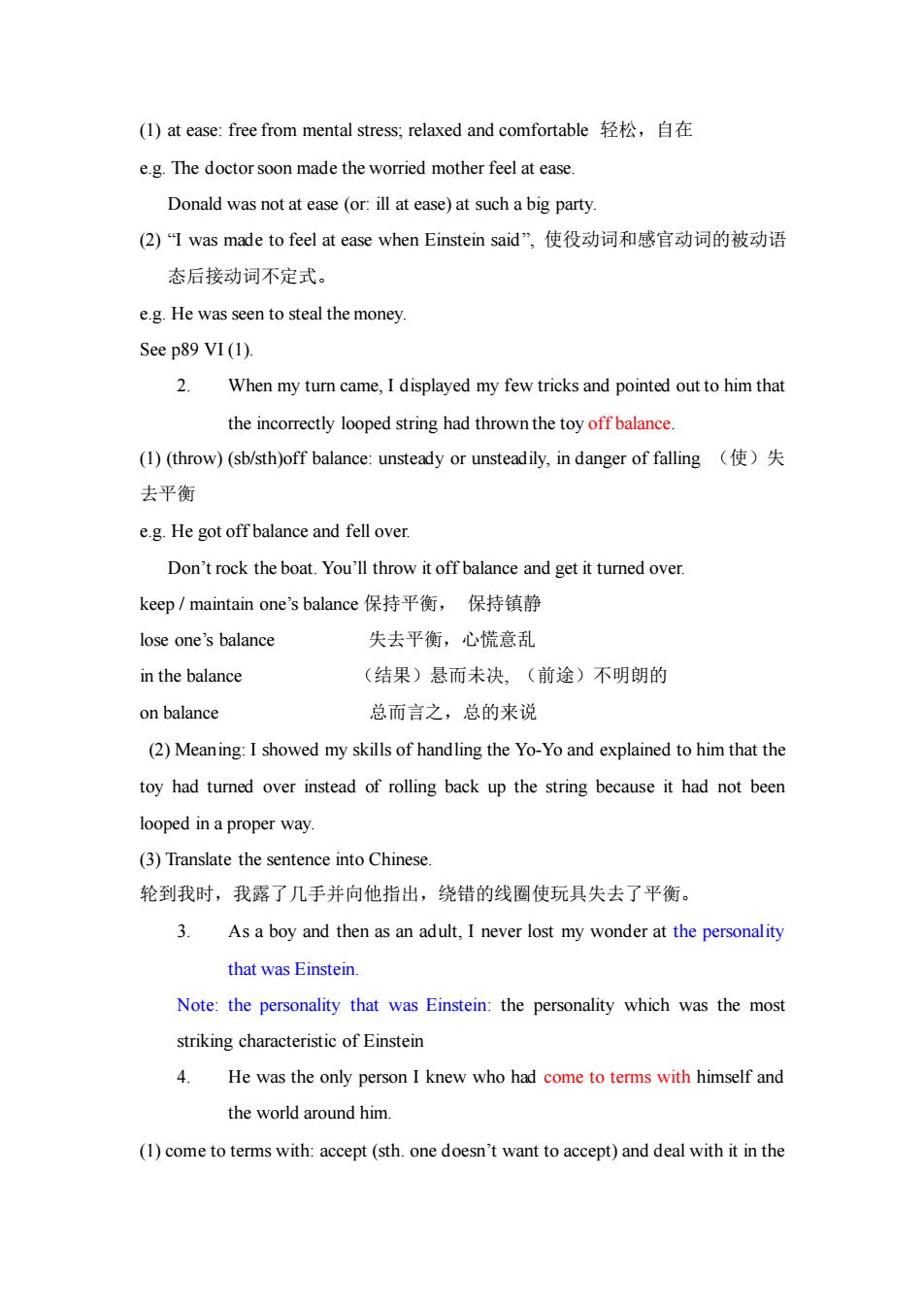
()at ease:free from mental stress,relaxed and comfortable轻松,自在 e.g.The doctor soon made the worried mother feel at ease. Donald was not at ease (or:ill at ease)at such a big party (2)"I was made to feel at ease when Einstein said”,使役动词和感官动词的被动语 态后接动词不定式。 e.g.He was seen to steal the money. See p89 VI(1). 2.When my turn came,I displayed my few tricks and pointed out to him that the incorrectly looped string had thrown the toy off balance. (1)(throw)(sb/sth)off balance:unsteady or unsteadily,in danger of falling 去平衡 e.g.He got off balance and fell over. Don't rock the boat.You'll throw it off balance and get it turned over. kcep/maintain one's balance保持平衡,保持镇静 lose one's balance 失去平衡,心慌意乱 in the balance (结果)悬而未决,(前途)不明朗的 on balance 总而言之,总的来说 (2)Meaning:I showed my skills of handling the Yo-Yo and explained to him that the toy had turned over instead of rolling back up the string because it had not been looped in a proper way (3)Translate the sentence into Chinese 轮到我时,我露了几手并向他指出,绕错的线圈使玩具失去了平衡。 3.As a boy and then as an adult,I never lost my wonder at the personality that was Einstein Note:the personality that was Einstein:the personality which was the most striking characteristic of Einstein 4.He was the only person I knew who had come to terms with himself and the world around him (1)come to terms with:accept(sth.one doesn't want to accept)and deal with it in the
(1) at ease: free from mental stress; relaxed and comfortable 轻松,自在 e.g. The doctor soon made the worried mother feel at ease. Donald was not at ease (or: ill at ease) at such a big party. (2) “I was made to feel at ease when Einstein said”, 使役动词和感官动词的被动语 态后接动词不定式。 e.g. He was seen to steal the money. See p89 VI (1). 2. When my turn came, I displayed my few tricks and pointed out to him that the incorrectly looped string had thrown the toy off balance. (1) (throw) (sb/sth)off balance: unsteady or unsteadily, in danger of falling (使)失 去平衡 e.g. He got off balance and fell over. Don’t rock the boat. You’ll throw it off balance and get it turned over. keep / maintain one’s balance 保持平衡, 保持镇静 lose one’s balance 失去平衡,心慌意乱 in the balance (结果)悬而未决, (前途)不明朗的 on balance 总而言之,总的来说 (2) Meaning: I showed my skills of handling the Yo-Yo and explained to him that the toy had turned over instead of rolling back up the string because it had not been looped in a proper way. (3) Translate the sentence into Chinese. 轮到我时,我露了几手并向他指出,绕错的线圈使玩具失去了平衡。 3. As a boy and then as an adult, I never lost my wonder at the personality that was Einstein. Note: the personality that was Einstein: the personality which was the most striking characteristic of Einstein 4. He was the only person I knew who had come to terms with himself and the world around him. (1) come to terms with: accept (sth. one doesn’t want to accept) and deal with it in the

best way one can与.达成协议,与.妥协 e.g.In less than a year,he came to terms with his life and work there. They came to terms after long bargaining It has taken me a long time to come to terms with the fact that I'll never be a good writer. (2)Q:What can we infer from the sentence? A:We can infer from the sentence that Einstein was at peace with himself and the world.He accepted the world as it was and knew his own limits. He knew there were answers beyond his intellectual reach (1)He knew that the universe had more mysteries than he could ever hope solve.great as his intellectual capabilities were. (2)Translate the sentence into Chinese. 他知道有许多问题的答案超出了他智力所及的范围。 6. He seemed immune to these emotions.He was beyond any pretension. ()immune::a.not affected by有免疫力,不受影响的 e.g.Vaccination makes people immune to smallpox. It seems to me that few people are immune to vanity or jealousy (2)Q:What can we infer from the sentences? A:Einstein seemed unaffected by these feelings.He was completely sincere and honest without the slightest intention to show off. 7. Although he corresponded with many of the world's most important people, correspond:vi. l)write letters to each other与.通信 e.g.Do they often correspond with each other? Mary and Peter corresponded for many years before they met. 2)be in agreement,.harmony,or conformity与.一致,符合 e.g.Her job correspondswi/to her interests. His actions do not correspond witl/to his words
best way one can 与…达成协议,与…妥协 e.g. In less than a year, he came to terms with his life and work there. They came to terms after long bargaining. It has taken me a long time to come to terms with the fact that I’ll never be a good writer. (2) Q: What can we infer from the sentence? A: We can infer from the sentence that Einstein was at peace with himself and the world. He accepted the world as it was and knew his own limits. 5. He knew there were answers beyond his intellectual reach. (1) He knew that the universe had more mysteries than he could ever hope solve, great as his intellectual capabilities were. (2) Translate the sentence into Chinese. 他知道有许多问题的答案超出了他智力所及的范围。 6. He seemed immune to these emotions. He was beyond any pretension. (1) immune: adj. not affected by 有免疫力,不受影响的 e.g. Vaccination makes people immune to smallpox. It seems to me that few people are immune to vanity or jealousy. (2) Q: What can we infer from the sentences? A: Einstein seemed unaffected by these feelings. He was completely sincere and honest without the slightest intention to show off. 7. Although he corresponded with many of the world’s most important people, correspond: vi. 1) write letters to each other 与…通信 e.g. Do they often correspond with each other? Mary and Peter corresponded for many years before they met. 2) be in agreement, harmony, or conformity 与…一致,符合 e.g. Her job corresponds with/ to her interests. His actions do not correspond with/to his words

3)be equivalent or similar类似于,相当于 e.g.The American Congress corresponds to the British Parliament. 8.Material things meant nothing to him. mean nothing/everything to:be of no/great importance or value to对.不重要/重要 e.g.Your friendship means everything to me. Material things meant nothing to Einstein,but to some people they mean everything. 9.He believed in simplicity,so much so that he used only a safety razor and water to shave. so much so that::to such an extent that如此..以至于 e.g.He longed to visit Paris,so much so that he oftendreamt about it I was wom out,so much so that I thought I would never recover. 10.Then he reverted to using plain water. revert to:go back to(a former condition or habit)回复,恢复 e.g.The stress he felt made him revert to his old habit of smoking. My thought reverted to my childhood days. 11.He pursued various theories for several days until I suggested we take the toy apart to see how it did work. ()take apart:separate(sth.)into parts拆开 e.g.The professor spent the whole aftemoon taking apart his old car. Nick took apart the clock and spread the bits all over the carpet (2)What is the implied meaning of the sentence? For a few days,he continued several theories to explain how the Yo-Yo worked before I suggested that we separate it to have a look.Here we can see that Einstein was a purely theorist and did not take interest in practical use of theories.Sometimes he could not solve practical problems. (3)Translate the sentence into Chinese. 他连续几天试着用各种理论来解释,后来是我建议把玩具拆开来看看它是怎 样运转的。 12.He had developed theories that were profound and capable of exciting
3) be equivalent or similar 类似于,相当于 e.g. The American Congress corresponds to the British Parliament. 8. Material things meant nothing to him. mean nothing/everything to: be of no/great importance or value to 对…不重要/重要 e.g. Your friendship means everything to me. Material things meant nothing to Einstein, but to some people they mean everything. 9. He believed in simplicity, so much so that he used only a safety razor and water to shave. so much so that: to such an extent that 如此…以至于 e.g. He longed to visit Paris, so much so that he often dreamt about it. I was worn out, so much so that I thought I would never recover. 10. Then he reverted to using plain water. revert to: go back to (a former condition or habit) 回复,恢复 e.g. The stress he felt made him revert to his old habit of smoking. My thought reverted to my childhood days. 11. He pursued various theories for several days until I suggested we take the toy apart to see how it did work. (1) take apart: separate (sth.) into parts 拆开 e.g. The professor spent the whole afternoon taking apart his old car. Nick took apart the clock and spread the bits all over the carpet. (2) What is the implied meaning of the sentence? For a few days, he continued several theories to explain how the Yo-Yo worked before I suggested that we separate it to have a look. Here we can see that Einstein was a purely theorist and did not take interest in practical use of theories. Sometimes he could not solve practical problems. (3) Translate the sentence into Chinese. 他连续几天试着用各种理论来解释,后来是我建议把玩具拆开来看看它是怎 样运转的。 12. He had developed theories that were profound and capable of exciting

relatively few scientists. Meaning:His theories were so difficult to understand that only a small number of scientists became interested in them 13.Yet his name was a household word across the civilized world. (1)a household word:a word or a name known and spoken of by almost everyone 喻户晓的词或(名字) (2)Meaning:Nevertheless,he was a person whose name was known by almost everybody throughout the civilized countries. 14.He was bewildered by his fame bewilder::v.confuse,.puzzle使迷惑,使糊涂 e.g.The child was bewildered by the noise and the crowds She was totally bewildered by his suddenchange of mood. 15.He never could understand why he received this attention,why he was singled out as something special single out:choose and give special treatment选出,挑出 e.g.They all did wrong;why single him out for punishment? Three students in our class were singled out for special praise Step Four:Post-reading 1.Main idea of the text This text is mainly about the personality of Albert Einstein.Great as he was,he still remained simple,modest,and easy-going.He was immune to negative emotions such as jealousy,vanity,bitterness and personal ambition.He did not attach much importance to material things.Being exclusively a theorist.he didn't have the slightest interest in the practical application of his ideas and theories.He was bewildered by his own fame. 2.Table completion:An Analysis of Einstein's Personality
relatively few scientists. Meaning: His theories were so difficult to understand that only a small number of scientists became interested in them. 13. Yet his name was a household word across the civilized world. (1) a household word: a word or a name known and spoken of by almost everyone 家 喻户晓的词或(名字) (2) Meaning: Nevertheless,he was a person whose name was known by almost everybody throughout the civilized countries. 14. He was bewildered by his fame bewilder: vt. confuse, puzzle 使迷惑,使糊涂 e.g. The child was bewildered by the noise and the crowds. She was totally bewildered by his sudden change of mood. 15. He never could understand why he received this attention, why he was singled out as something special. single out: choose and give special treatment 选出,挑出 e.g. They all did wrong; why single him out for punishment? Three students in our class were singled out for special praise. Step Four:Post-reading 1. Main idea of the text This text is mainly about the personality of Albert Einstein. Great as he was, he still remained simple, modest, and easy-going. He was immune to negative emotions such as jealousy, vanity, bitterness and personal ambition. He did not attach much importance to material things. Being exclusively a theorist, he didn’t have the slightest interest in the practical application of his ideas and theories. He was bewildered by his own fame. 2. Table completion: An Analysis of Einstein’s Personality
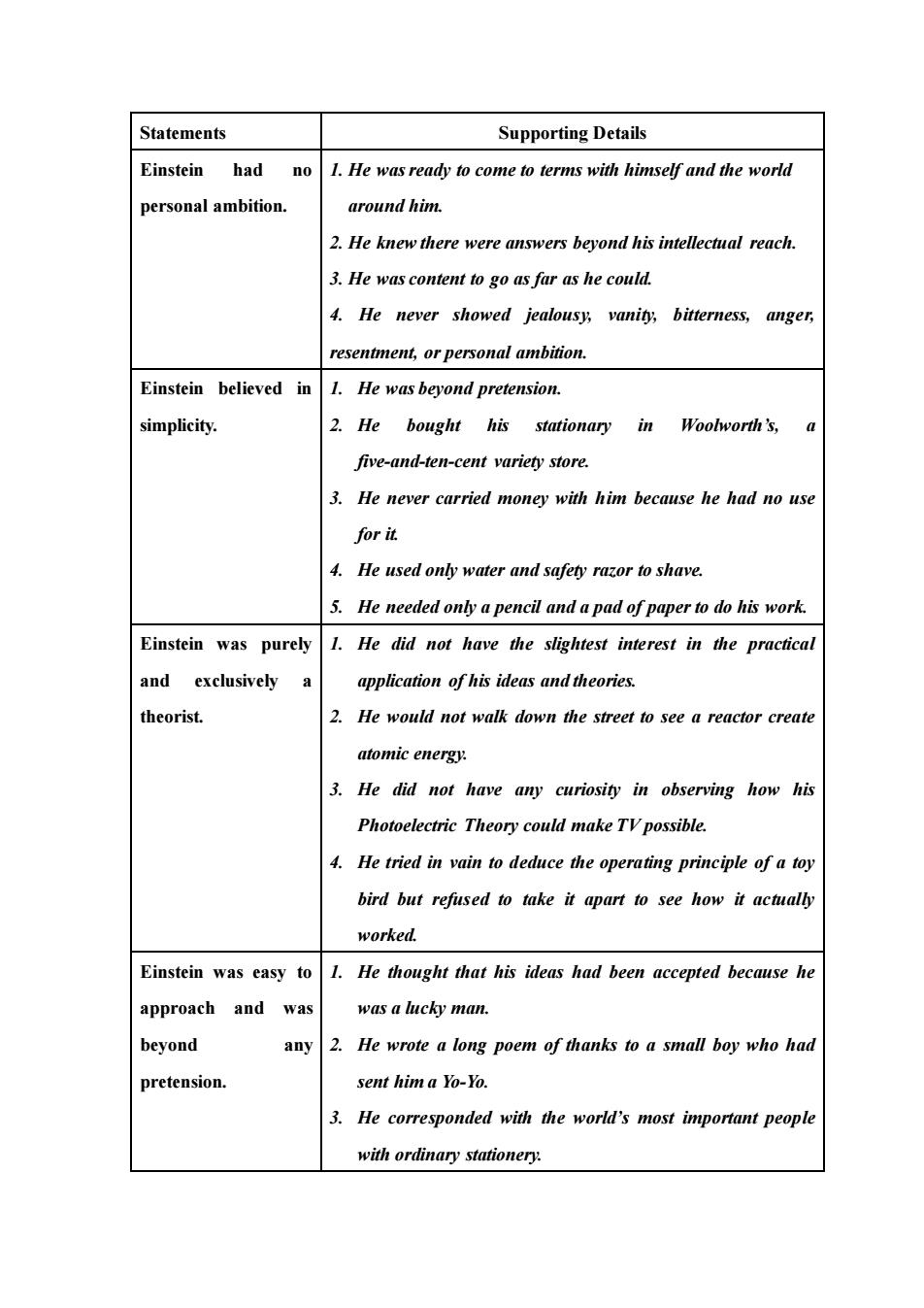
Statements Supporting Details Einstein had no 1.He was ready to come to terms with himself and the world personal ambition. around him. 2.He knew there were answers beyond his intellectual reach. 3.He was content to go as far as he could. 4.He never showed jealousy,vanity,bitterness,anger resentment,or personal ambition. Einstein believed in 1.He was beyond pretension. simplicity. 2.He bought his stationary in Woolworth's,a five-and-ten-cent variety store. 3.He never carried money with him because he had no use for it. 4.He used only water and safety razor to shave. 5.He needed only a pencil and a pad of paper to do his work. Einstein was purely 1.He did not have the slightest interest in the practical and exclusively application of his ideas and theories. theorist. He would not walk down the street to see a reactor create atomic energy. 3.He did not have any curiosity in observing how his Photoelectric Theory could make TV possible. 4.He tried in vain to deduce the operating principle of a toy bird but refused to take it apart to see how it actually worked. Einstein was easy to 1.He thought that his ideas had been accepted because he approach and was was a lucky man. beyond any 2.He wrote a long poem of thanks to a small boy who had pretension. sent him a Yo-Yo. 3.He corresponded with the world's most important people with ordinary stationery
Statements Supporting Details Einstein had no personal ambition. 1. He was ready to come to terms with himself and the world around him. 2. He knew there were answers beyond his intellectual reach. 3. He was content to go as far as he could. 4. He never showed jealousy, vanity, bitterness, anger, resentment, or personal ambition. Einstein believed in simplicity. 1. He was beyond pretension. 2. He bought his stationary in Woolworth’s, a five-and-ten-cent variety store. 3. He never carried money with him because he had no use for it. 4. He used only water and safety razor to shave. 5. He needed only a pencil and a pad of paper to do his work. Einstein was purely and exclusively a theorist. 1. He did not have the slightest interest in the practical application of his ideas and theories. 2. He would not walk down the street to see a reactor create atomic energy. 3. He did not have any curiosity in observing how his Photoelectric Theory could make TV possible. 4. He tried in vain to deduce the operating principle of a toy bird but refused to take it apart to see how it actually worked. Einstein was easy to approach and was beyond any pretension. 1. He thought that his ideas had been accepted because he was a lucky man. 2. He wrote a long poem of thanks to a small boy who had sent him a Yo-Yo. 3. He corresponded with the world’s most important people with ordinary stationery
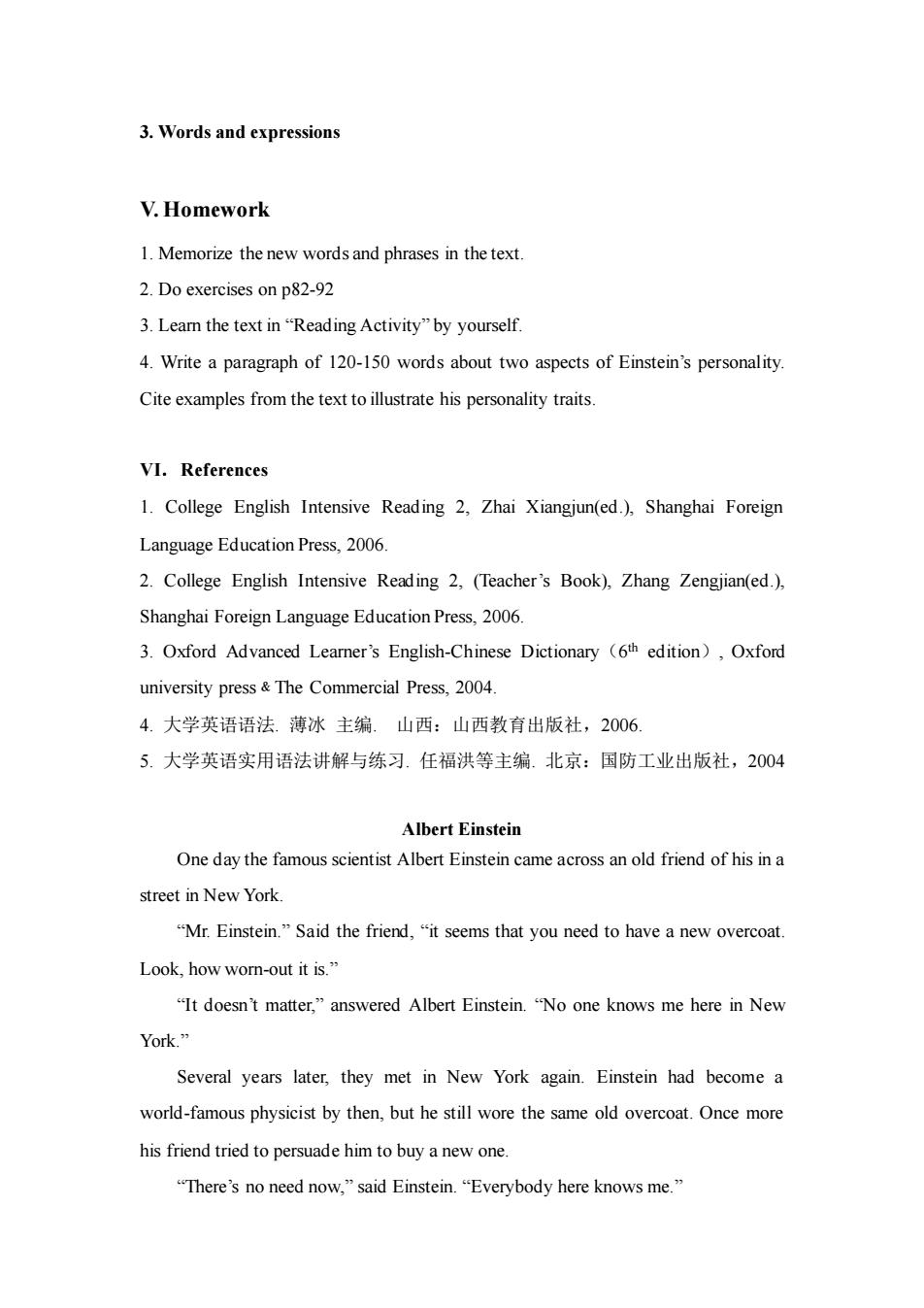
3.Words and expressions V.Homework 1.Memorize the new words and phrases in the text. 2.Do exercises on p82-92 3.Leam the text in"Reading Activity"by yourself. 4.Write a paragraph of 120-150 words about two aspects of Einstein's personality Cite examples from the text to illustrate his personality traits. VI.References 1.College English Intensive Reading 2,Zhai Xiangjun(ed.),Shanghai Foreign Language Education Press,2006. 2.College English Intensive Reading 2,(Teacher's Book).Zhang Zengjian(ed.), Shanghai Foreign Language Education Press,2006. 3.Oxford Advanced Learner's English-Chinese Dictionary (6h edition),Oxford university press&The Commercial Press,2004. 4.大学英语语法.薄冰主编。山西:山西教育出版社,2006, 5.大学英语实用语法讲解与练习.任福洪等主编.北京:国防工业出版社,2004 Albert Einstein One day the famous scientist Albert Einstein came across an od friend of his ina street in New York "Mr.Einstein."Said the friend,"it seems that you need to have a new overcoat Look,how womn-out it is." "It doesn't matter,"answered Albert Einstein."No one knows me here in New York.” Several years later,they met in New York again.Einstein had become a world-famous physicist by then,but he still wore the same old overcoat.Once more his friend tried to persuade him to buy a new one. "There's no need now,"said Einstein."Everybody here knows me
3. Words and expressions V. Homework 1. Memorize the new words and phrases in the text. 2. Do exercises on p82-92 3. Learn the text in “Reading Activity” by yourself. 4. Write a paragraph of 120-150 words about two aspects of Einstein’s personality. Cite examples from the text to illustrate his personality traits. VI.References 1. College English Intensive Reading 2, Zhai Xiangjun(ed.), Shanghai Foreign Language Education Press, 2006. 2. College English Intensive Reading 2, (Teacher’s Book), Zhang Zengjian(ed.), Shanghai Foreign Language Education Press, 2006. 3. Oxford Advanced Learner’s English-Chinese Dictionary(6 th edition), Oxford university press﹠The Commercial Press, 2004. 4. 大学英语语法. 薄冰 主编. 山西:山西教育出版社,2006. 5. 大学英语实用语法讲解与练习. 任福洪等主编. 北京:国防工业出版社,2004 Albert Einstein One day the famous scientist Albert Einstein came across an old friend of his in a street in New York. “Mr. Einstein.” Said the friend, “it seems that you need to have a new overcoat. Look, how worn-out it is.” “It doesn’t matter,” answered Albert Einstein. “No one knows me here in New York.” Several years later, they met in New York again. Einstein had become a world-famous physicist by then, but he still wore the same old overcoat. Once more his friend tried to persuade him to buy a new one. “There’s no need now,” said Einstein. “Everybody here knows me